Analysis of 4 Pines Brewing Company's Sustainability Approach
VerifiedAdded on 2020/02/19
|10
|2835
|236
Report
AI Summary
This report provides an in-depth analysis of 4 Pines Brewing Company's sustainability initiatives. It examines the company's people-focused approach, highlighting its emphasis on employee engagement, innovation, and ethical business practices. The report explores how 4 Pines integrates sustainability into its long-term goals, focusing on social and environmental responsibility. It compares 4 Pines' approach to real-life sustainability practices in the corporate world, considering factors such as corporate social responsibility (CSR), innovation, and community involvement. The analysis also discusses how the company's initiatives contribute to positive social and human outcomes, while also considering how these initiatives might differ in a different business context, particularly in comparison to competitors in the brewing industry and other sectors. The report concludes with a summary of the key findings and offers insights into the importance of sustainability as a crucial element of modern business strategy.
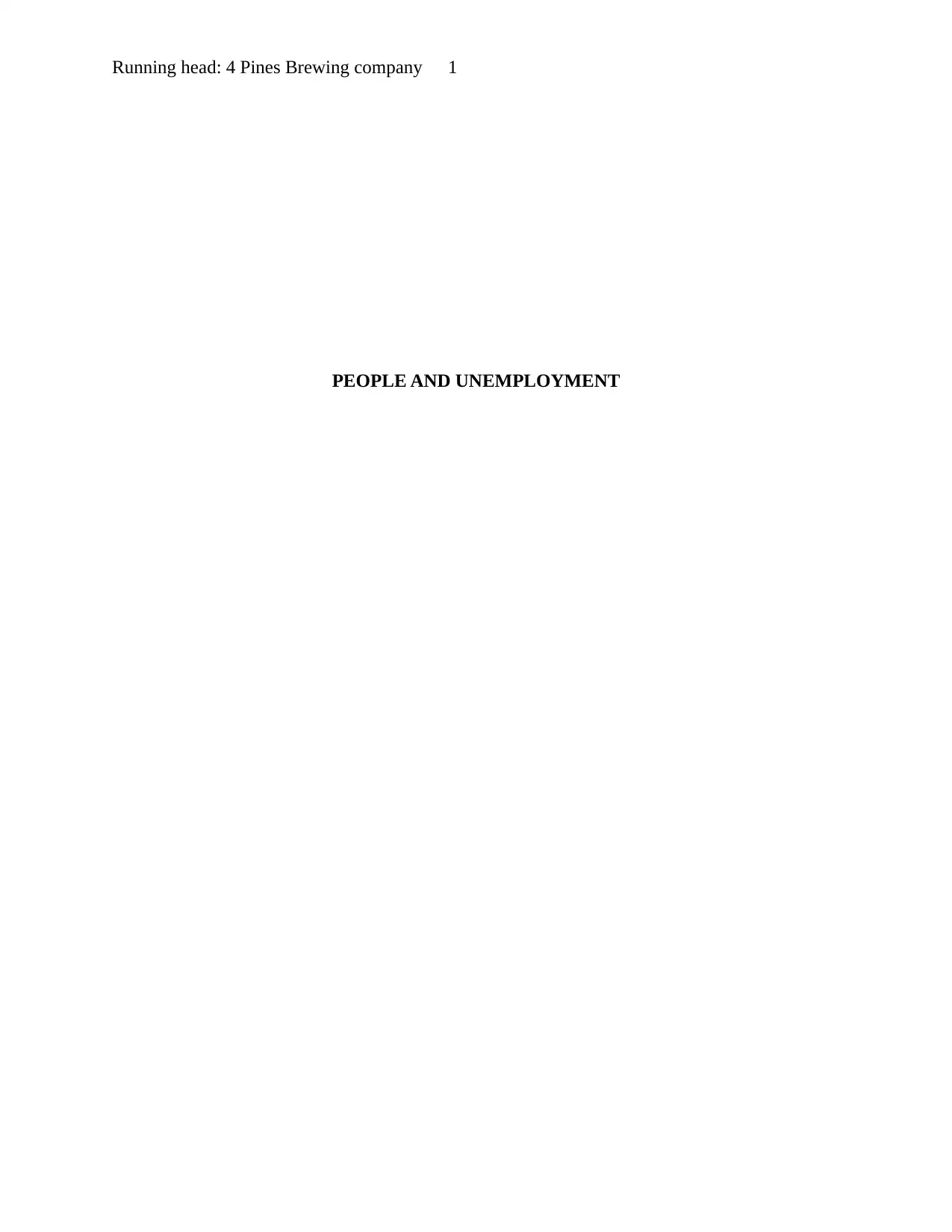
Running head: 4 Pines Brewing company 1
PEOPLE AND UNEMPLOYMENT
PEOPLE AND UNEMPLOYMENT
Paraphrase This Document
Need a fresh take? Get an instant paraphrase of this document with our AI Paraphraser
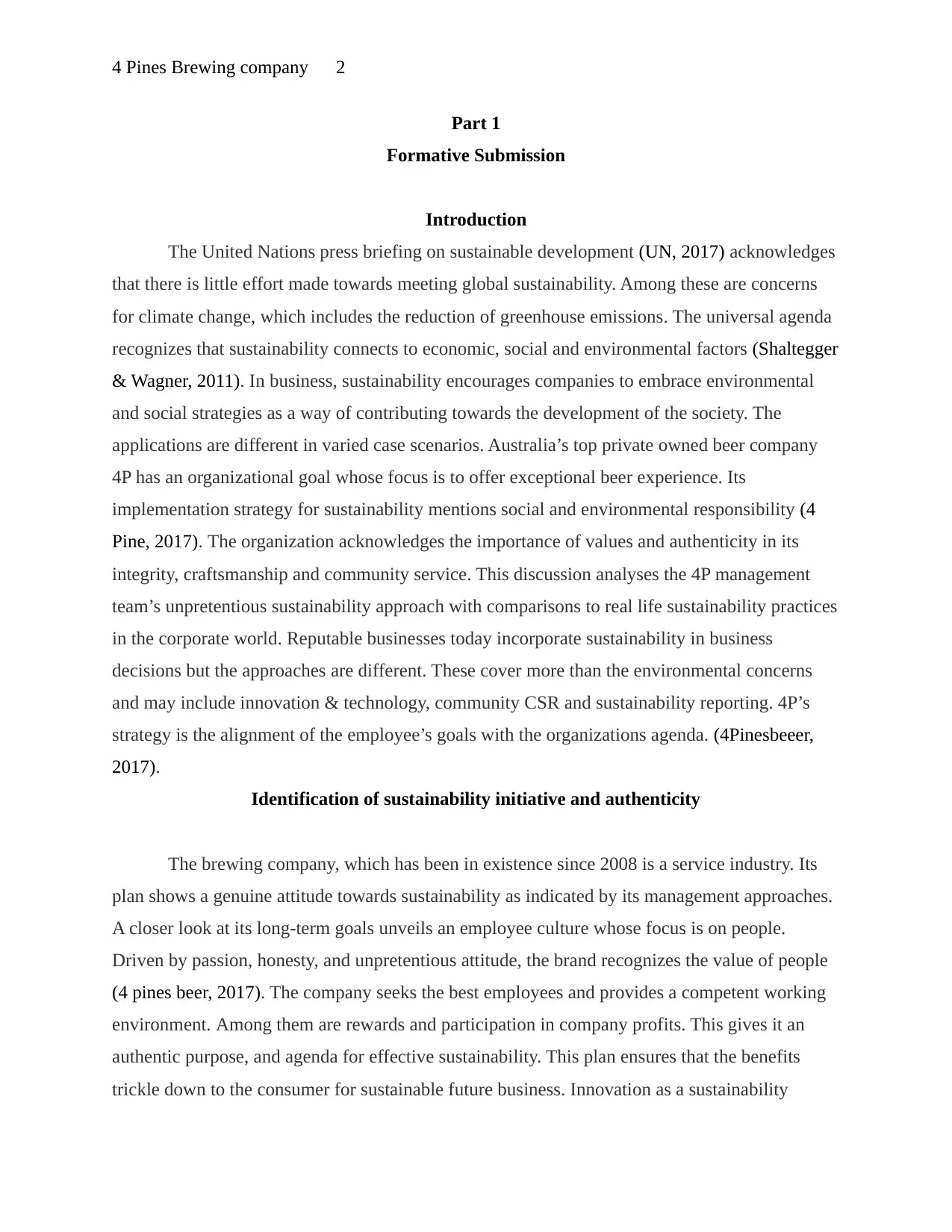
4 Pines Brewing company 2
Part 1
Formative Submission
Introduction
The United Nations press briefing on sustainable development (UN, 2017) acknowledges
that there is little effort made towards meeting global sustainability. Among these are concerns
for climate change, which includes the reduction of greenhouse emissions. The universal agenda
recognizes that sustainability connects to economic, social and environmental factors (Shaltegger
& Wagner, 2011). In business, sustainability encourages companies to embrace environmental
and social strategies as a way of contributing towards the development of the society. The
applications are different in varied case scenarios. Australia’s top private owned beer company
4P has an organizational goal whose focus is to offer exceptional beer experience. Its
implementation strategy for sustainability mentions social and environmental responsibility (4
Pine, 2017). The organization acknowledges the importance of values and authenticity in its
integrity, craftsmanship and community service. This discussion analyses the 4P management
team’s unpretentious sustainability approach with comparisons to real life sustainability practices
in the corporate world. Reputable businesses today incorporate sustainability in business
decisions but the approaches are different. These cover more than the environmental concerns
and may include innovation & technology, community CSR and sustainability reporting. 4P’s
strategy is the alignment of the employee’s goals with the organizations agenda. (4Pinesbeeer,
2017).
Identification of sustainability initiative and authenticity
The brewing company, which has been in existence since 2008 is a service industry. Its
plan shows a genuine attitude towards sustainability as indicated by its management approaches.
A closer look at its long-term goals unveils an employee culture whose focus is on people.
Driven by passion, honesty, and unpretentious attitude, the brand recognizes the value of people
(4 pines beer, 2017). The company seeks the best employees and provides a competent working
environment. Among them are rewards and participation in company profits. This gives it an
authentic purpose, and agenda for effective sustainability. This plan ensures that the benefits
trickle down to the consumer for sustainable future business. Innovation as a sustainability
Part 1
Formative Submission
Introduction
The United Nations press briefing on sustainable development (UN, 2017) acknowledges
that there is little effort made towards meeting global sustainability. Among these are concerns
for climate change, which includes the reduction of greenhouse emissions. The universal agenda
recognizes that sustainability connects to economic, social and environmental factors (Shaltegger
& Wagner, 2011). In business, sustainability encourages companies to embrace environmental
and social strategies as a way of contributing towards the development of the society. The
applications are different in varied case scenarios. Australia’s top private owned beer company
4P has an organizational goal whose focus is to offer exceptional beer experience. Its
implementation strategy for sustainability mentions social and environmental responsibility (4
Pine, 2017). The organization acknowledges the importance of values and authenticity in its
integrity, craftsmanship and community service. This discussion analyses the 4P management
team’s unpretentious sustainability approach with comparisons to real life sustainability practices
in the corporate world. Reputable businesses today incorporate sustainability in business
decisions but the approaches are different. These cover more than the environmental concerns
and may include innovation & technology, community CSR and sustainability reporting. 4P’s
strategy is the alignment of the employee’s goals with the organizations agenda. (4Pinesbeeer,
2017).
Identification of sustainability initiative and authenticity
The brewing company, which has been in existence since 2008 is a service industry. Its
plan shows a genuine attitude towards sustainability as indicated by its management approaches.
A closer look at its long-term goals unveils an employee culture whose focus is on people.
Driven by passion, honesty, and unpretentious attitude, the brand recognizes the value of people
(4 pines beer, 2017). The company seeks the best employees and provides a competent working
environment. Among them are rewards and participation in company profits. This gives it an
authentic purpose, and agenda for effective sustainability. This plan ensures that the benefits
trickle down to the consumer for sustainable future business. Innovation as a sustainability
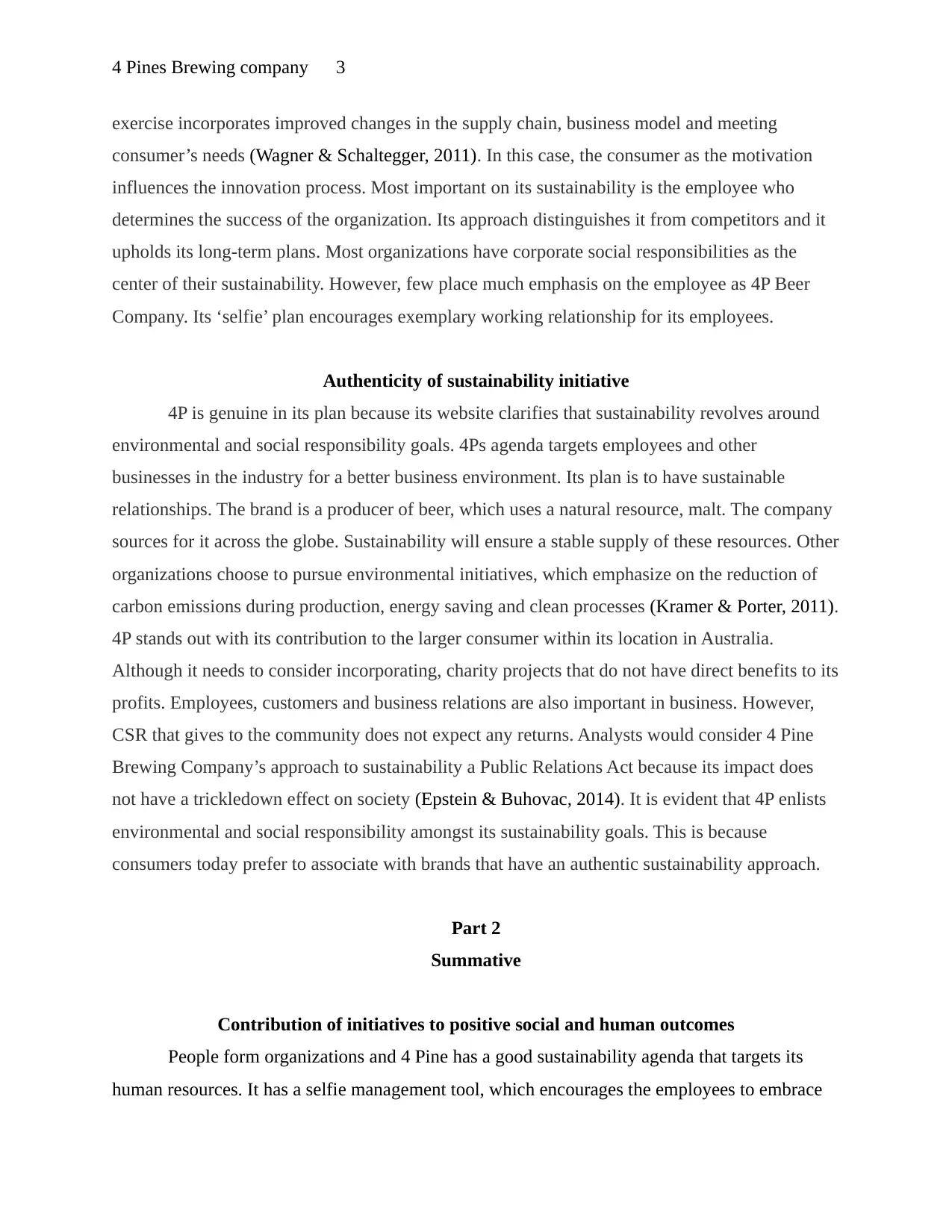
4 Pines Brewing company 3
exercise incorporates improved changes in the supply chain, business model and meeting
consumer’s needs (Wagner & Schaltegger, 2011). In this case, the consumer as the motivation
influences the innovation process. Most important on its sustainability is the employee who
determines the success of the organization. Its approach distinguishes it from competitors and it
upholds its long-term plans. Most organizations have corporate social responsibilities as the
center of their sustainability. However, few place much emphasis on the employee as 4P Beer
Company. Its ‘selfie’ plan encourages exemplary working relationship for its employees.
Authenticity of sustainability initiative
4P is genuine in its plan because its website clarifies that sustainability revolves around
environmental and social responsibility goals. 4Ps agenda targets employees and other
businesses in the industry for a better business environment. Its plan is to have sustainable
relationships. The brand is a producer of beer, which uses a natural resource, malt. The company
sources for it across the globe. Sustainability will ensure a stable supply of these resources. Other
organizations choose to pursue environmental initiatives, which emphasize on the reduction of
carbon emissions during production, energy saving and clean processes (Kramer & Porter, 2011).
4P stands out with its contribution to the larger consumer within its location in Australia.
Although it needs to consider incorporating, charity projects that do not have direct benefits to its
profits. Employees, customers and business relations are also important in business. However,
CSR that gives to the community does not expect any returns. Analysts would consider 4 Pine
Brewing Company’s approach to sustainability a Public Relations Act because its impact does
not have a trickledown effect on society (Epstein & Buhovac, 2014). It is evident that 4P enlists
environmental and social responsibility amongst its sustainability goals. This is because
consumers today prefer to associate with brands that have an authentic sustainability approach.
Part 2
Summative
Contribution of initiatives to positive social and human outcomes
People form organizations and 4 Pine has a good sustainability agenda that targets its
human resources. It has a selfie management tool, which encourages the employees to embrace
exercise incorporates improved changes in the supply chain, business model and meeting
consumer’s needs (Wagner & Schaltegger, 2011). In this case, the consumer as the motivation
influences the innovation process. Most important on its sustainability is the employee who
determines the success of the organization. Its approach distinguishes it from competitors and it
upholds its long-term plans. Most organizations have corporate social responsibilities as the
center of their sustainability. However, few place much emphasis on the employee as 4P Beer
Company. Its ‘selfie’ plan encourages exemplary working relationship for its employees.
Authenticity of sustainability initiative
4P is genuine in its plan because its website clarifies that sustainability revolves around
environmental and social responsibility goals. 4Ps agenda targets employees and other
businesses in the industry for a better business environment. Its plan is to have sustainable
relationships. The brand is a producer of beer, which uses a natural resource, malt. The company
sources for it across the globe. Sustainability will ensure a stable supply of these resources. Other
organizations choose to pursue environmental initiatives, which emphasize on the reduction of
carbon emissions during production, energy saving and clean processes (Kramer & Porter, 2011).
4P stands out with its contribution to the larger consumer within its location in Australia.
Although it needs to consider incorporating, charity projects that do not have direct benefits to its
profits. Employees, customers and business relations are also important in business. However,
CSR that gives to the community does not expect any returns. Analysts would consider 4 Pine
Brewing Company’s approach to sustainability a Public Relations Act because its impact does
not have a trickledown effect on society (Epstein & Buhovac, 2014). It is evident that 4P enlists
environmental and social responsibility amongst its sustainability goals. This is because
consumers today prefer to associate with brands that have an authentic sustainability approach.
Part 2
Summative
Contribution of initiatives to positive social and human outcomes
People form organizations and 4 Pine has a good sustainability agenda that targets its
human resources. It has a selfie management tool, which encourages the employees to embrace
⊘ This is a preview!⊘
Do you want full access?
Subscribe today to unlock all pages.

Trusted by 1+ million students worldwide
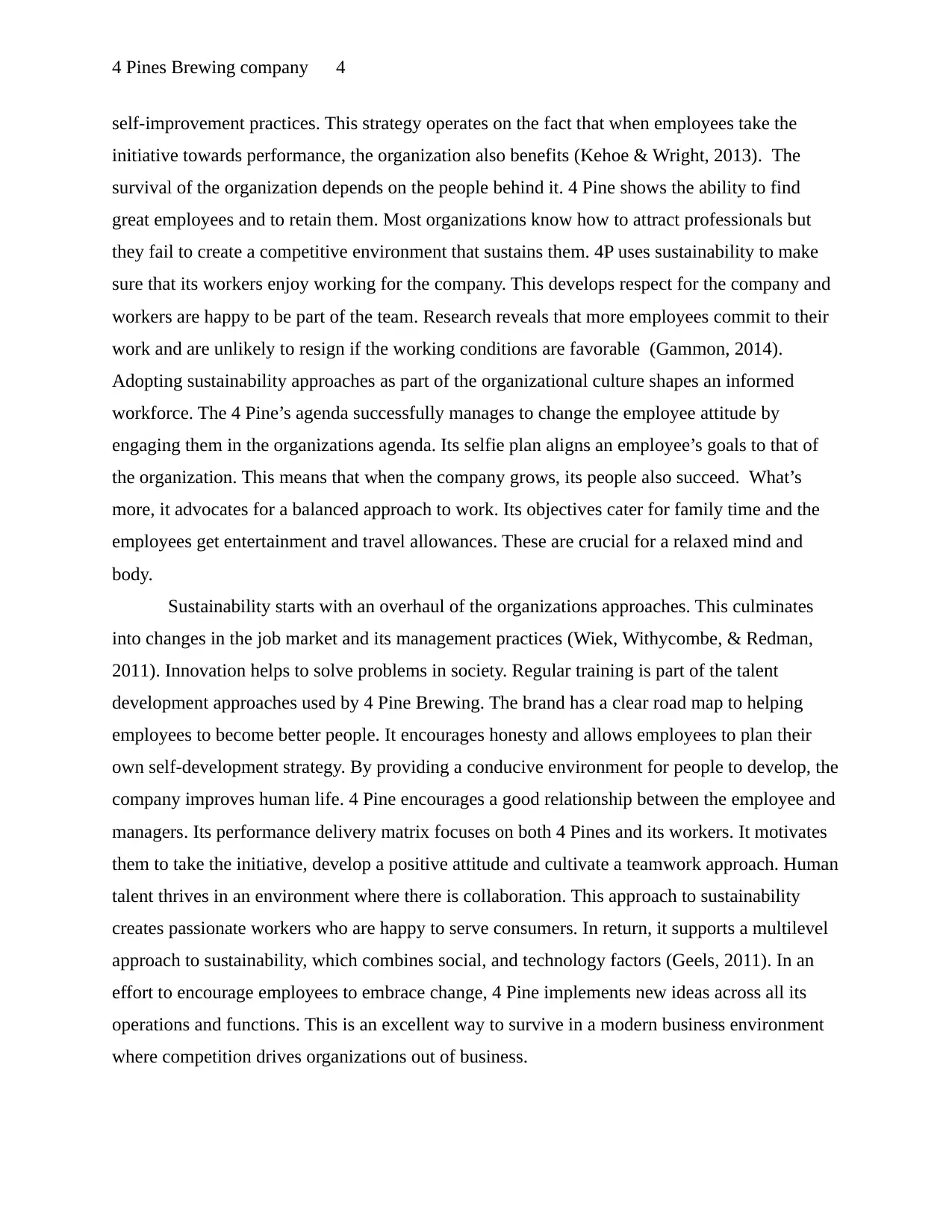
4 Pines Brewing company 4
self-improvement practices. This strategy operates on the fact that when employees take the
initiative towards performance, the organization also benefits (Kehoe & Wright, 2013). The
survival of the organization depends on the people behind it. 4 Pine shows the ability to find
great employees and to retain them. Most organizations know how to attract professionals but
they fail to create a competitive environment that sustains them. 4P uses sustainability to make
sure that its workers enjoy working for the company. This develops respect for the company and
workers are happy to be part of the team. Research reveals that more employees commit to their
work and are unlikely to resign if the working conditions are favorable (Gammon, 2014).
Adopting sustainability approaches as part of the organizational culture shapes an informed
workforce. The 4 Pine’s agenda successfully manages to change the employee attitude by
engaging them in the organizations agenda. Its selfie plan aligns an employee’s goals to that of
the organization. This means that when the company grows, its people also succeed. What’s
more, it advocates for a balanced approach to work. Its objectives cater for family time and the
employees get entertainment and travel allowances. These are crucial for a relaxed mind and
body.
Sustainability starts with an overhaul of the organizations approaches. This culminates
into changes in the job market and its management practices (Wiek, Withycombe, & Redman,
2011). Innovation helps to solve problems in society. Regular training is part of the talent
development approaches used by 4 Pine Brewing. The brand has a clear road map to helping
employees to become better people. It encourages honesty and allows employees to plan their
own self-development strategy. By providing a conducive environment for people to develop, the
company improves human life. 4 Pine encourages a good relationship between the employee and
managers. Its performance delivery matrix focuses on both 4 Pines and its workers. It motivates
them to take the initiative, develop a positive attitude and cultivate a teamwork approach. Human
talent thrives in an environment where there is collaboration. This approach to sustainability
creates passionate workers who are happy to serve consumers. In return, it supports a multilevel
approach to sustainability, which combines social, and technology factors (Geels, 2011). In an
effort to encourage employees to embrace change, 4 Pine implements new ideas across all its
operations and functions. This is an excellent way to survive in a modern business environment
where competition drives organizations out of business.
self-improvement practices. This strategy operates on the fact that when employees take the
initiative towards performance, the organization also benefits (Kehoe & Wright, 2013). The
survival of the organization depends on the people behind it. 4 Pine shows the ability to find
great employees and to retain them. Most organizations know how to attract professionals but
they fail to create a competitive environment that sustains them. 4P uses sustainability to make
sure that its workers enjoy working for the company. This develops respect for the company and
workers are happy to be part of the team. Research reveals that more employees commit to their
work and are unlikely to resign if the working conditions are favorable (Gammon, 2014).
Adopting sustainability approaches as part of the organizational culture shapes an informed
workforce. The 4 Pine’s agenda successfully manages to change the employee attitude by
engaging them in the organizations agenda. Its selfie plan aligns an employee’s goals to that of
the organization. This means that when the company grows, its people also succeed. What’s
more, it advocates for a balanced approach to work. Its objectives cater for family time and the
employees get entertainment and travel allowances. These are crucial for a relaxed mind and
body.
Sustainability starts with an overhaul of the organizations approaches. This culminates
into changes in the job market and its management practices (Wiek, Withycombe, & Redman,
2011). Innovation helps to solve problems in society. Regular training is part of the talent
development approaches used by 4 Pine Brewing. The brand has a clear road map to helping
employees to become better people. It encourages honesty and allows employees to plan their
own self-development strategy. By providing a conducive environment for people to develop, the
company improves human life. 4 Pine encourages a good relationship between the employee and
managers. Its performance delivery matrix focuses on both 4 Pines and its workers. It motivates
them to take the initiative, develop a positive attitude and cultivate a teamwork approach. Human
talent thrives in an environment where there is collaboration. This approach to sustainability
creates passionate workers who are happy to serve consumers. In return, it supports a multilevel
approach to sustainability, which combines social, and technology factors (Geels, 2011). In an
effort to encourage employees to embrace change, 4 Pine implements new ideas across all its
operations and functions. This is an excellent way to survive in a modern business environment
where competition drives organizations out of business.
Paraphrase This Document
Need a fresh take? Get an instant paraphrase of this document with our AI Paraphraser
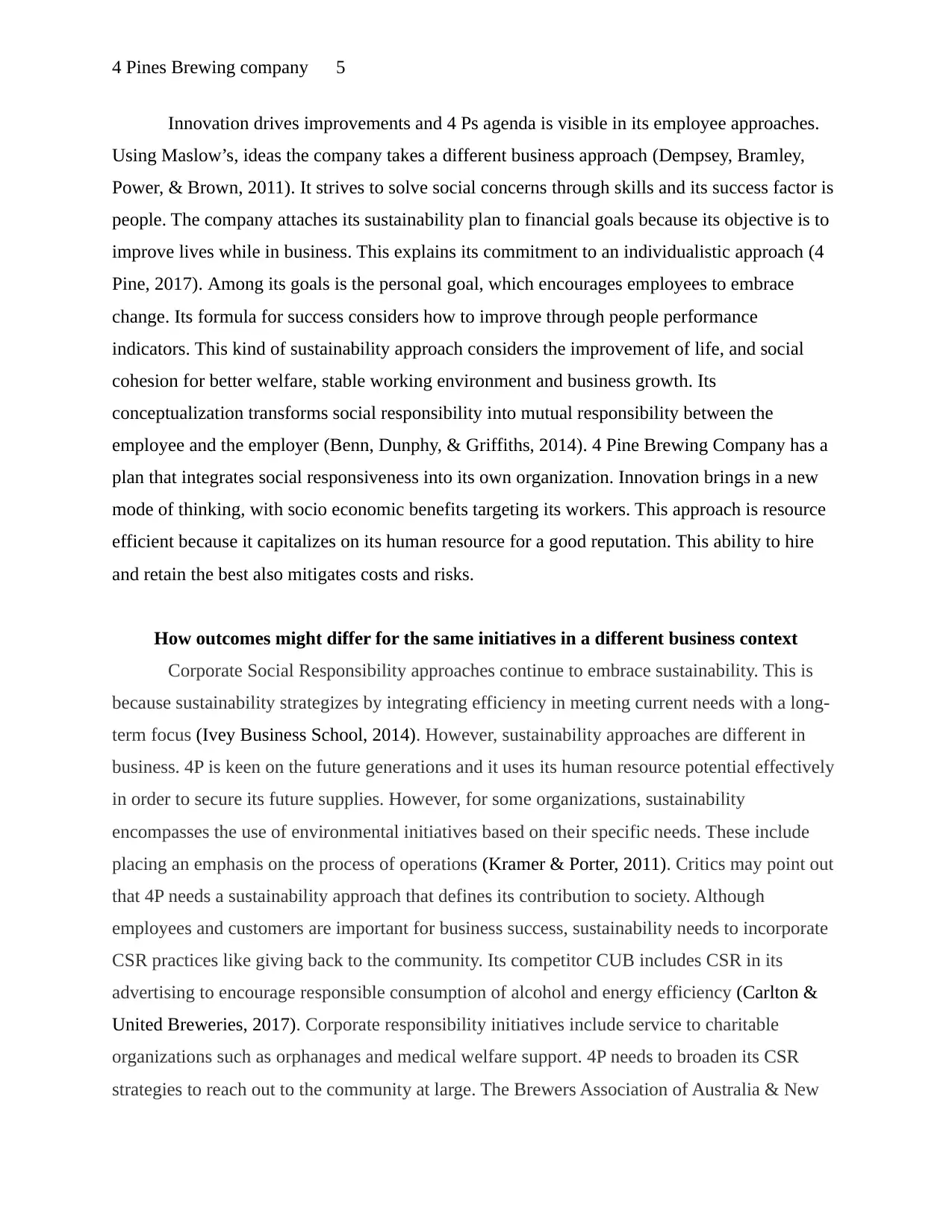
4 Pines Brewing company 5
Innovation drives improvements and 4 Ps agenda is visible in its employee approaches.
Using Maslow’s, ideas the company takes a different business approach (Dempsey, Bramley,
Power, & Brown, 2011). It strives to solve social concerns through skills and its success factor is
people. The company attaches its sustainability plan to financial goals because its objective is to
improve lives while in business. This explains its commitment to an individualistic approach (4
Pine, 2017). Among its goals is the personal goal, which encourages employees to embrace
change. Its formula for success considers how to improve through people performance
indicators. This kind of sustainability approach considers the improvement of life, and social
cohesion for better welfare, stable working environment and business growth. Its
conceptualization transforms social responsibility into mutual responsibility between the
employee and the employer (Benn, Dunphy, & Griffiths, 2014). 4 Pine Brewing Company has a
plan that integrates social responsiveness into its own organization. Innovation brings in a new
mode of thinking, with socio economic benefits targeting its workers. This approach is resource
efficient because it capitalizes on its human resource for a good reputation. This ability to hire
and retain the best also mitigates costs and risks.
How outcomes might differ for the same initiatives in a different business context
Corporate Social Responsibility approaches continue to embrace sustainability. This is
because sustainability strategizes by integrating efficiency in meeting current needs with a long-
term focus (Ivey Business School, 2014). However, sustainability approaches are different in
business. 4P is keen on the future generations and it uses its human resource potential effectively
in order to secure its future supplies. However, for some organizations, sustainability
encompasses the use of environmental initiatives based on their specific needs. These include
placing an emphasis on the process of operations (Kramer & Porter, 2011). Critics may point out
that 4P needs a sustainability approach that defines its contribution to society. Although
employees and customers are important for business success, sustainability needs to incorporate
CSR practices like giving back to the community. Its competitor CUB includes CSR in its
advertising to encourage responsible consumption of alcohol and energy efficiency (Carlton &
United Breweries, 2017). Corporate responsibility initiatives include service to charitable
organizations such as orphanages and medical welfare support. 4P needs to broaden its CSR
strategies to reach out to the community at large. The Brewers Association of Australia & New
Innovation drives improvements and 4 Ps agenda is visible in its employee approaches.
Using Maslow’s, ideas the company takes a different business approach (Dempsey, Bramley,
Power, & Brown, 2011). It strives to solve social concerns through skills and its success factor is
people. The company attaches its sustainability plan to financial goals because its objective is to
improve lives while in business. This explains its commitment to an individualistic approach (4
Pine, 2017). Among its goals is the personal goal, which encourages employees to embrace
change. Its formula for success considers how to improve through people performance
indicators. This kind of sustainability approach considers the improvement of life, and social
cohesion for better welfare, stable working environment and business growth. Its
conceptualization transforms social responsibility into mutual responsibility between the
employee and the employer (Benn, Dunphy, & Griffiths, 2014). 4 Pine Brewing Company has a
plan that integrates social responsiveness into its own organization. Innovation brings in a new
mode of thinking, with socio economic benefits targeting its workers. This approach is resource
efficient because it capitalizes on its human resource for a good reputation. This ability to hire
and retain the best also mitigates costs and risks.
How outcomes might differ for the same initiatives in a different business context
Corporate Social Responsibility approaches continue to embrace sustainability. This is
because sustainability strategizes by integrating efficiency in meeting current needs with a long-
term focus (Ivey Business School, 2014). However, sustainability approaches are different in
business. 4P is keen on the future generations and it uses its human resource potential effectively
in order to secure its future supplies. However, for some organizations, sustainability
encompasses the use of environmental initiatives based on their specific needs. These include
placing an emphasis on the process of operations (Kramer & Porter, 2011). Critics may point out
that 4P needs a sustainability approach that defines its contribution to society. Although
employees and customers are important for business success, sustainability needs to incorporate
CSR practices like giving back to the community. Its competitor CUB includes CSR in its
advertising to encourage responsible consumption of alcohol and energy efficiency (Carlton &
United Breweries, 2017). Corporate responsibility initiatives include service to charitable
organizations such as orphanages and medical welfare support. 4P needs to broaden its CSR
strategies to reach out to the community at large. The Brewers Association of Australia & New
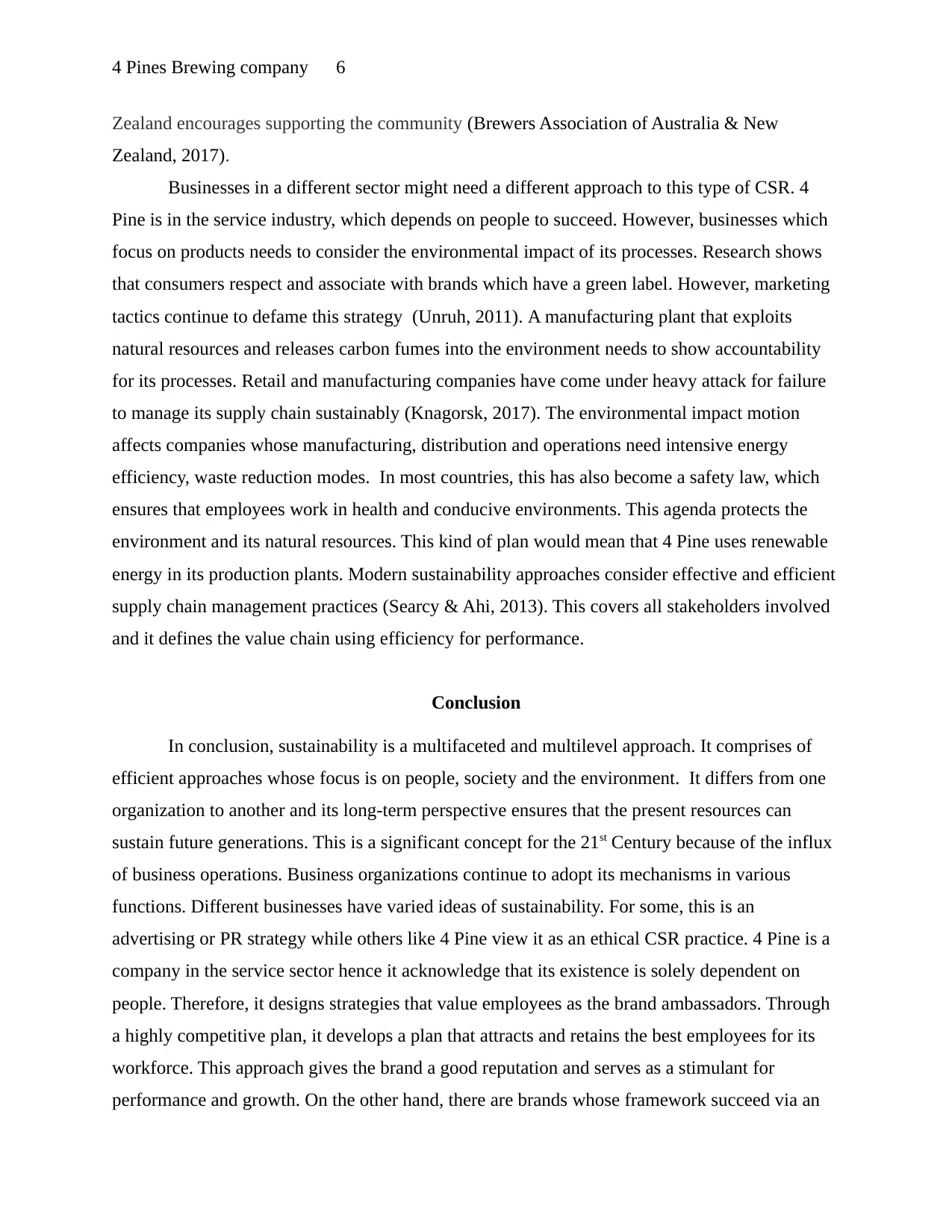
4 Pines Brewing company 6
Zealand encourages supporting the community (Brewers Association of Australia & New
Zealand, 2017).
Businesses in a different sector might need a different approach to this type of CSR. 4
Pine is in the service industry, which depends on people to succeed. However, businesses which
focus on products needs to consider the environmental impact of its processes. Research shows
that consumers respect and associate with brands which have a green label. However, marketing
tactics continue to defame this strategy (Unruh, 2011). A manufacturing plant that exploits
natural resources and releases carbon fumes into the environment needs to show accountability
for its processes. Retail and manufacturing companies have come under heavy attack for failure
to manage its supply chain sustainably (Knagorsk, 2017). The environmental impact motion
affects companies whose manufacturing, distribution and operations need intensive energy
efficiency, waste reduction modes. In most countries, this has also become a safety law, which
ensures that employees work in health and conducive environments. This agenda protects the
environment and its natural resources. This kind of plan would mean that 4 Pine uses renewable
energy in its production plants. Modern sustainability approaches consider effective and efficient
supply chain management practices (Searcy & Ahi, 2013). This covers all stakeholders involved
and it defines the value chain using efficiency for performance.
Conclusion
In conclusion, sustainability is a multifaceted and multilevel approach. It comprises of
efficient approaches whose focus is on people, society and the environment. It differs from one
organization to another and its long-term perspective ensures that the present resources can
sustain future generations. This is a significant concept for the 21st Century because of the influx
of business operations. Business organizations continue to adopt its mechanisms in various
functions. Different businesses have varied ideas of sustainability. For some, this is an
advertising or PR strategy while others like 4 Pine view it as an ethical CSR practice. 4 Pine is a
company in the service sector hence it acknowledge that its existence is solely dependent on
people. Therefore, it designs strategies that value employees as the brand ambassadors. Through
a highly competitive plan, it develops a plan that attracts and retains the best employees for its
workforce. This approach gives the brand a good reputation and serves as a stimulant for
performance and growth. On the other hand, there are brands whose framework succeed via an
Zealand encourages supporting the community (Brewers Association of Australia & New
Zealand, 2017).
Businesses in a different sector might need a different approach to this type of CSR. 4
Pine is in the service industry, which depends on people to succeed. However, businesses which
focus on products needs to consider the environmental impact of its processes. Research shows
that consumers respect and associate with brands which have a green label. However, marketing
tactics continue to defame this strategy (Unruh, 2011). A manufacturing plant that exploits
natural resources and releases carbon fumes into the environment needs to show accountability
for its processes. Retail and manufacturing companies have come under heavy attack for failure
to manage its supply chain sustainably (Knagorsk, 2017). The environmental impact motion
affects companies whose manufacturing, distribution and operations need intensive energy
efficiency, waste reduction modes. In most countries, this has also become a safety law, which
ensures that employees work in health and conducive environments. This agenda protects the
environment and its natural resources. This kind of plan would mean that 4 Pine uses renewable
energy in its production plants. Modern sustainability approaches consider effective and efficient
supply chain management practices (Searcy & Ahi, 2013). This covers all stakeholders involved
and it defines the value chain using efficiency for performance.
Conclusion
In conclusion, sustainability is a multifaceted and multilevel approach. It comprises of
efficient approaches whose focus is on people, society and the environment. It differs from one
organization to another and its long-term perspective ensures that the present resources can
sustain future generations. This is a significant concept for the 21st Century because of the influx
of business operations. Business organizations continue to adopt its mechanisms in various
functions. Different businesses have varied ideas of sustainability. For some, this is an
advertising or PR strategy while others like 4 Pine view it as an ethical CSR practice. 4 Pine is a
company in the service sector hence it acknowledge that its existence is solely dependent on
people. Therefore, it designs strategies that value employees as the brand ambassadors. Through
a highly competitive plan, it develops a plan that attracts and retains the best employees for its
workforce. This approach gives the brand a good reputation and serves as a stimulant for
performance and growth. On the other hand, there are brands whose framework succeed via an
⊘ This is a preview!⊘
Do you want full access?
Subscribe today to unlock all pages.

Trusted by 1+ million students worldwide
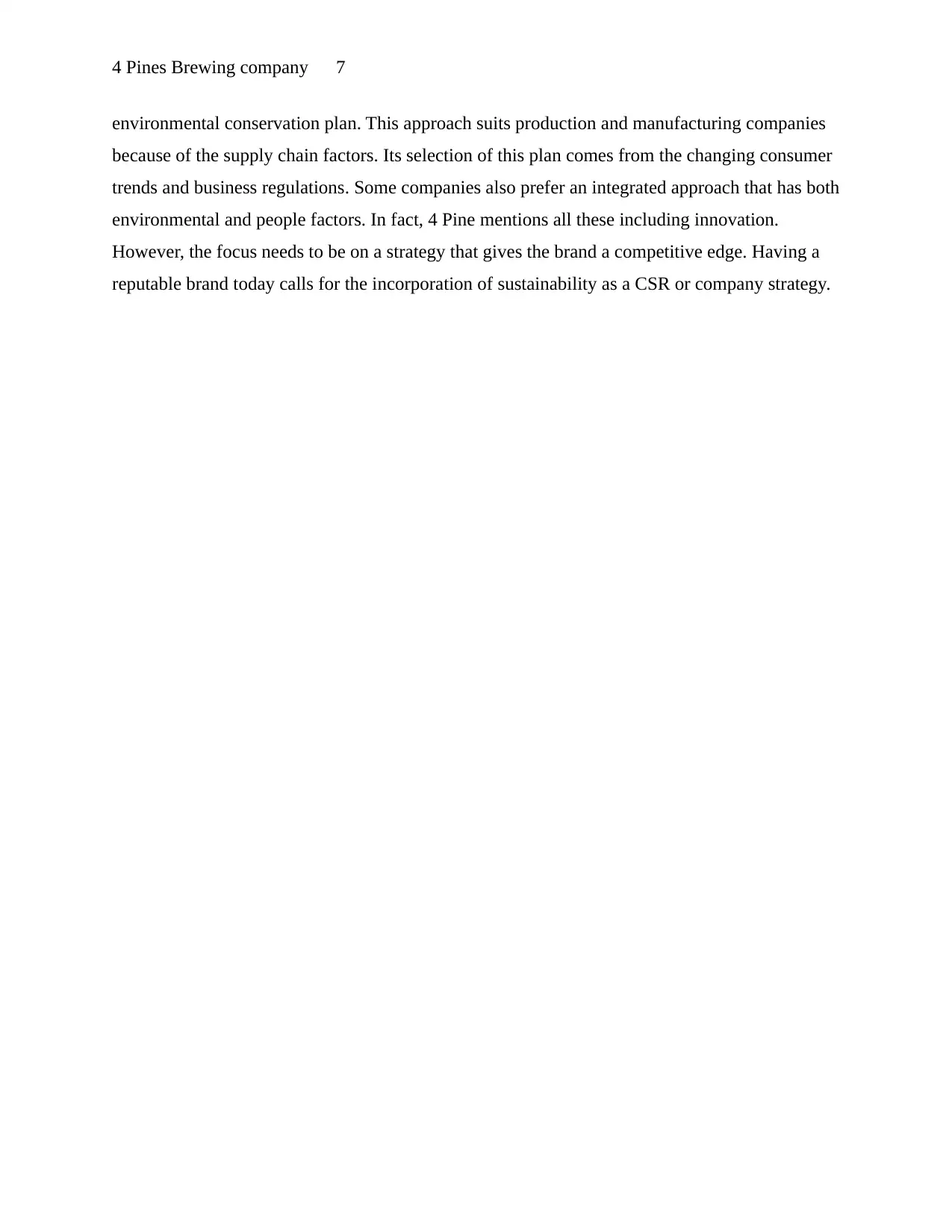
4 Pines Brewing company 7
environmental conservation plan. This approach suits production and manufacturing companies
because of the supply chain factors. Its selection of this plan comes from the changing consumer
trends and business regulations. Some companies also prefer an integrated approach that has both
environmental and people factors. In fact, 4 Pine mentions all these including innovation.
However, the focus needs to be on a strategy that gives the brand a competitive edge. Having a
reputable brand today calls for the incorporation of sustainability as a CSR or company strategy.
environmental conservation plan. This approach suits production and manufacturing companies
because of the supply chain factors. Its selection of this plan comes from the changing consumer
trends and business regulations. Some companies also prefer an integrated approach that has both
environmental and people factors. In fact, 4 Pine mentions all these including innovation.
However, the focus needs to be on a strategy that gives the brand a competitive edge. Having a
reputable brand today calls for the incorporation of sustainability as a CSR or company strategy.
Paraphrase This Document
Need a fresh take? Get an instant paraphrase of this document with our AI Paraphraser
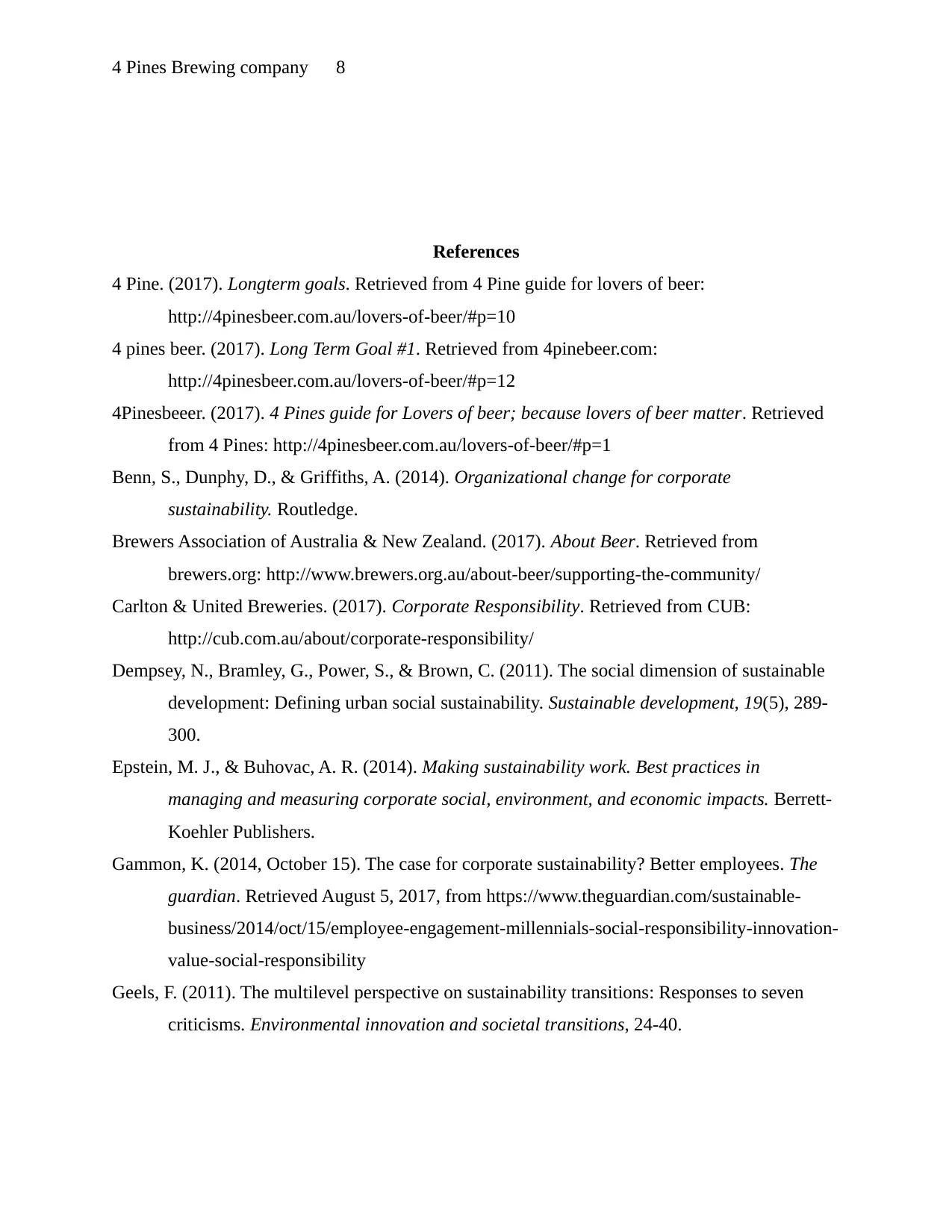
4 Pines Brewing company 8
References
4 Pine. (2017). Longterm goals. Retrieved from 4 Pine guide for lovers of beer:
http://4pinesbeer.com.au/lovers-of-beer/#p=10
4 pines beer. (2017). Long Term Goal #1. Retrieved from 4pinebeer.com:
http://4pinesbeer.com.au/lovers-of-beer/#p=12
4Pinesbeeer. (2017). 4 Pines guide for Lovers of beer; because lovers of beer matter. Retrieved
from 4 Pines: http://4pinesbeer.com.au/lovers-of-beer/#p=1
Benn, S., Dunphy, D., & Griffiths, A. (2014). Organizational change for corporate
sustainability. Routledge.
Brewers Association of Australia & New Zealand. (2017). About Beer. Retrieved from
brewers.org: http://www.brewers.org.au/about-beer/supporting-the-community/
Carlton & United Breweries. (2017). Corporate Responsibility. Retrieved from CUB:
http://cub.com.au/about/corporate-responsibility/
Dempsey, N., Bramley, G., Power, S., & Brown, C. (2011). The social dimension of sustainable
development: Defining urban social sustainability. Sustainable development, 19(5), 289-
300.
Epstein, M. J., & Buhovac, A. R. (2014). Making sustainability work. Best practices in
managing and measuring corporate social, environment, and economic impacts. Berrett-
Koehler Publishers.
Gammon, K. (2014, October 15). The case for corporate sustainability? Better employees. The
guardian. Retrieved August 5, 2017, from https://www.theguardian.com/sustainable-
business/2014/oct/15/employee-engagement-millennials-social-responsibility-innovation-
value-social-responsibility
Geels, F. (2011). The multilevel perspective on sustainability transitions: Responses to seven
criticisms. Environmental innovation and societal transitions, 24-40.
References
4 Pine. (2017). Longterm goals. Retrieved from 4 Pine guide for lovers of beer:
http://4pinesbeer.com.au/lovers-of-beer/#p=10
4 pines beer. (2017). Long Term Goal #1. Retrieved from 4pinebeer.com:
http://4pinesbeer.com.au/lovers-of-beer/#p=12
4Pinesbeeer. (2017). 4 Pines guide for Lovers of beer; because lovers of beer matter. Retrieved
from 4 Pines: http://4pinesbeer.com.au/lovers-of-beer/#p=1
Benn, S., Dunphy, D., & Griffiths, A. (2014). Organizational change for corporate
sustainability. Routledge.
Brewers Association of Australia & New Zealand. (2017). About Beer. Retrieved from
brewers.org: http://www.brewers.org.au/about-beer/supporting-the-community/
Carlton & United Breweries. (2017). Corporate Responsibility. Retrieved from CUB:
http://cub.com.au/about/corporate-responsibility/
Dempsey, N., Bramley, G., Power, S., & Brown, C. (2011). The social dimension of sustainable
development: Defining urban social sustainability. Sustainable development, 19(5), 289-
300.
Epstein, M. J., & Buhovac, A. R. (2014). Making sustainability work. Best practices in
managing and measuring corporate social, environment, and economic impacts. Berrett-
Koehler Publishers.
Gammon, K. (2014, October 15). The case for corporate sustainability? Better employees. The
guardian. Retrieved August 5, 2017, from https://www.theguardian.com/sustainable-
business/2014/oct/15/employee-engagement-millennials-social-responsibility-innovation-
value-social-responsibility
Geels, F. (2011). The multilevel perspective on sustainability transitions: Responses to seven
criticisms. Environmental innovation and societal transitions, 24-40.
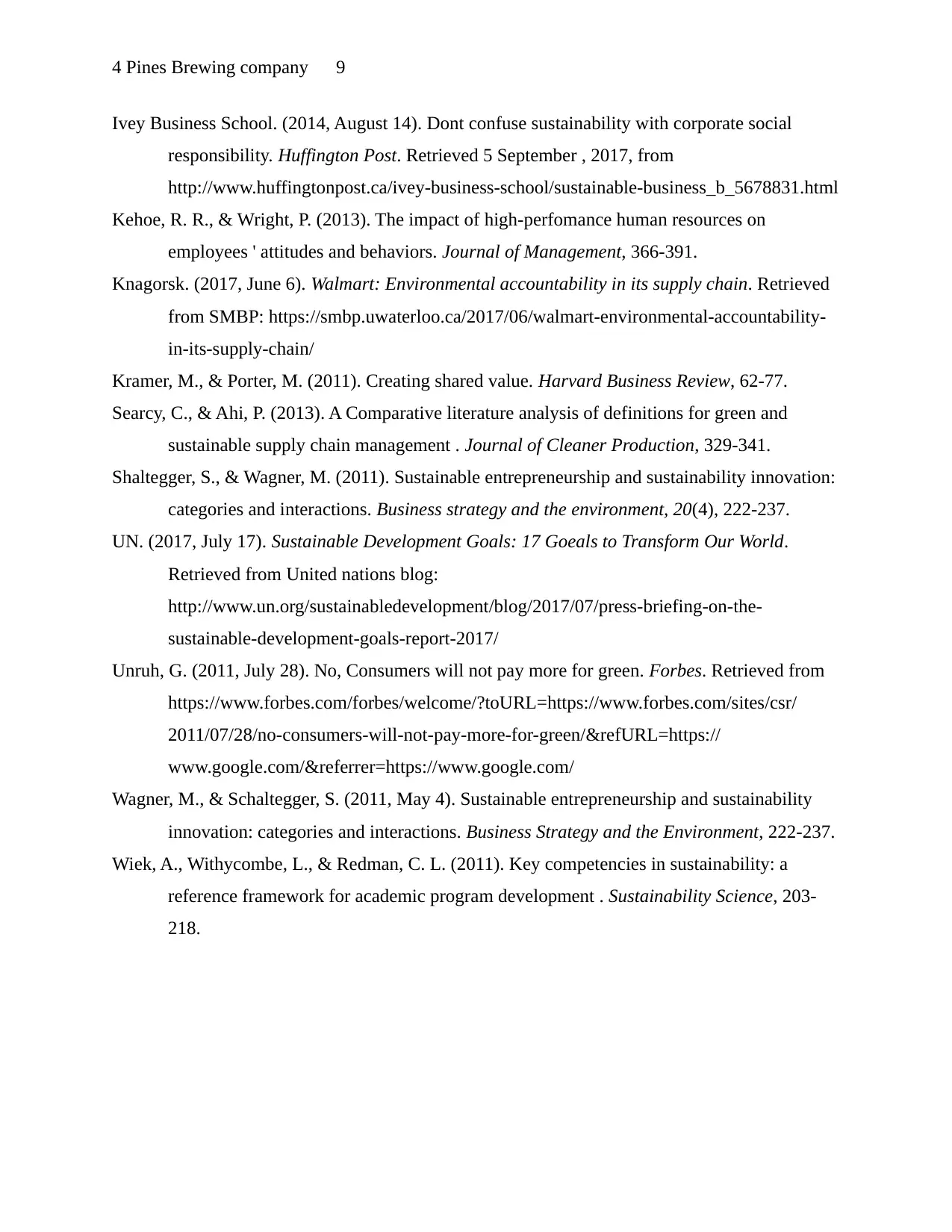
4 Pines Brewing company 9
Ivey Business School. (2014, August 14). Dont confuse sustainability with corporate social
responsibility. Huffington Post. Retrieved 5 September , 2017, from
http://www.huffingtonpost.ca/ivey-business-school/sustainable-business_b_5678831.html
Kehoe, R. R., & Wright, P. (2013). The impact of high-perfomance human resources on
employees ' attitudes and behaviors. Journal of Management, 366-391.
Knagorsk. (2017, June 6). Walmart: Environmental accountability in its supply chain. Retrieved
from SMBP: https://smbp.uwaterloo.ca/2017/06/walmart-environmental-accountability-
in-its-supply-chain/
Kramer, M., & Porter, M. (2011). Creating shared value. Harvard Business Review, 62-77.
Searcy, C., & Ahi, P. (2013). A Comparative literature analysis of definitions for green and
sustainable supply chain management . Journal of Cleaner Production, 329-341.
Shaltegger, S., & Wagner, M. (2011). Sustainable entrepreneurship and sustainability innovation:
categories and interactions. Business strategy and the environment, 20(4), 222-237.
UN. (2017, July 17). Sustainable Development Goals: 17 Goeals to Transform Our World.
Retrieved from United nations blog:
http://www.un.org/sustainabledevelopment/blog/2017/07/press-briefing-on-the-
sustainable-development-goals-report-2017/
Unruh, G. (2011, July 28). No, Consumers will not pay more for green. Forbes. Retrieved from
https://www.forbes.com/forbes/welcome/?toURL=https://www.forbes.com/sites/csr/
2011/07/28/no-consumers-will-not-pay-more-for-green/&refURL=https://
www.google.com/&referrer=https://www.google.com/
Wagner, M., & Schaltegger, S. (2011, May 4). Sustainable entrepreneurship and sustainability
innovation: categories and interactions. Business Strategy and the Environment, 222-237.
Wiek, A., Withycombe, L., & Redman, C. L. (2011). Key competencies in sustainability: a
reference framework for academic program development . Sustainability Science, 203-
218.
Ivey Business School. (2014, August 14). Dont confuse sustainability with corporate social
responsibility. Huffington Post. Retrieved 5 September , 2017, from
http://www.huffingtonpost.ca/ivey-business-school/sustainable-business_b_5678831.html
Kehoe, R. R., & Wright, P. (2013). The impact of high-perfomance human resources on
employees ' attitudes and behaviors. Journal of Management, 366-391.
Knagorsk. (2017, June 6). Walmart: Environmental accountability in its supply chain. Retrieved
from SMBP: https://smbp.uwaterloo.ca/2017/06/walmart-environmental-accountability-
in-its-supply-chain/
Kramer, M., & Porter, M. (2011). Creating shared value. Harvard Business Review, 62-77.
Searcy, C., & Ahi, P. (2013). A Comparative literature analysis of definitions for green and
sustainable supply chain management . Journal of Cleaner Production, 329-341.
Shaltegger, S., & Wagner, M. (2011). Sustainable entrepreneurship and sustainability innovation:
categories and interactions. Business strategy and the environment, 20(4), 222-237.
UN. (2017, July 17). Sustainable Development Goals: 17 Goeals to Transform Our World.
Retrieved from United nations blog:
http://www.un.org/sustainabledevelopment/blog/2017/07/press-briefing-on-the-
sustainable-development-goals-report-2017/
Unruh, G. (2011, July 28). No, Consumers will not pay more for green. Forbes. Retrieved from
https://www.forbes.com/forbes/welcome/?toURL=https://www.forbes.com/sites/csr/
2011/07/28/no-consumers-will-not-pay-more-for-green/&refURL=https://
www.google.com/&referrer=https://www.google.com/
Wagner, M., & Schaltegger, S. (2011, May 4). Sustainable entrepreneurship and sustainability
innovation: categories and interactions. Business Strategy and the Environment, 222-237.
Wiek, A., Withycombe, L., & Redman, C. L. (2011). Key competencies in sustainability: a
reference framework for academic program development . Sustainability Science, 203-
218.
⊘ This is a preview!⊘
Do you want full access?
Subscribe today to unlock all pages.

Trusted by 1+ million students worldwide

4 Pines Brewing company 10
1 out of 10
Related Documents
Your All-in-One AI-Powered Toolkit for Academic Success.
+13062052269
info@desklib.com
Available 24*7 on WhatsApp / Email
![[object Object]](/_next/static/media/star-bottom.7253800d.svg)
Unlock your academic potential
Copyright © 2020–2026 A2Z Services. All Rights Reserved. Developed and managed by ZUCOL.





